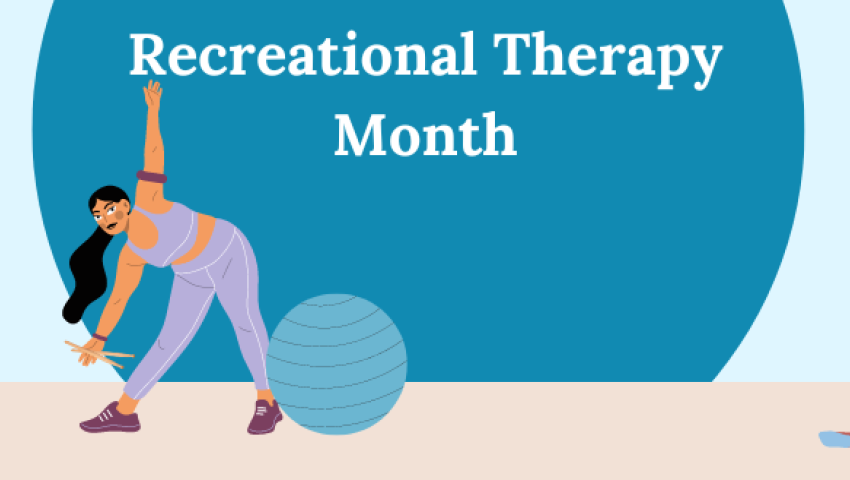The Behavioral Health Wellness Environments for Living and Learning (BH WELL) research team exists to promote behavioral health and wellness among individuals facing behavioral health challenges. To learn more about BH WELL, visit our website. Interested in more evidence-based, free mental and behavioral health resources? Follow us @ukbhwell on Instagram, Facebook, and Twitter.

Therapy that Activates Joy and Healing
As Recreational Therapy Month comes to an end, it is important to reflect on the many ways this therapy impacts individual well-being and wellness. Recreational therapy uses music, games, and crafts to promote healing. It focuses on mental, physical, emotional, social, and spiritual functioning by organically integrating these activities into the week. Are you still wondering, what recreational therapy is? Well, we are glad you asked so that we can share how recreation and therapy, working together as a team, can promote well-being!
The American Therapeutic Recreation Association (ATRA) states that recreational therapy involves treatment services that, “are designed to restore, remediate, and rehabilitate a person's level of functioning and independence in life activities, to promote health and wellness as well as reduce or illuminate the activity limitations and restrictions to participate in life situations caused by an illness or disabling condition.” This therapy is provided by Certified Therapeutic Recreation Specialists (CTRS) in a variety of settings which include, but are not limited to, mental health facilities, physical rehabilitation facilities, skilled nursing facilities, and acute care hospitals. No matter what the setting is, our health, wellness, and quality of life are likely to benefit from participating in various recreational activities because while in addition to being fun, our body enjoys the wellness benefits from them as well.
Within the recreational therapy process, leisure activities are used as interventions to determine what can help enhance the client's mental and behavioral health. When participating in recreational therapy, the client will learn how to work through feelings more comfortably and increase positive emotions. The recreational therapist facilitates activities that help with goal setting, coping skills, processing trauma, and expressing feelings which may lead to improved self-esteem and increased independence. Hope Therapy Center notes that benefits of this therapy include, “improved self-determination, increased emotional regulation, increased optimism, and feelings of autonomy”.
Additionally, recreational therapy can integrate physical activity which has shown to increase positive mood. Cardio drumming is a cardio work-out that has risen in popularity as a recreational activity that nearly everyone can enjoy whether you are a drummer or just want to have fun! This exercise uses vibrant music, a work-out ball, and drumsticks to engage in movement and fitness. In fact, a study examining the effects of cardio drumming on stress and self-esteem levels in an in-patient psychiatric hospital found that after doing this activity, stress levels decreased and self-esteem scores increased. Through these findings we can see the benefits of emphasizing the interconnection of mind, body, and spirit within the healing journey.
Recreational therapy is recognized for its ability to incorporate fun and enjoyable activities for therapeutic purposes. Recreational therapy offers people who are living with mental and behavioral health challenges a variety of unique methods to navigate the healing process. Through goal setting, coping skill enhancement, and cultivating a sense of positivity, individuals are provided with an opportunity to explore their emotional experiences in a liberating and empowering manner. Recreational therapy in mental health recovery emphasizes holistic well-being and focuses on empowering individuals to lead fulfilling and meaningful lives. It complements other forms of treatment and supports individuals in developing coping strategies, building resilience, and achieving their recovery goals.
Citations
Herwig, J. M., Gennaro, V. E., Layne, A. S., & Okoli, C. (Zim) T. (2023). Effect of cardio drumming on stress and self-esteem in an inpatient psychiatric hospital. American Journal of Recreation Therapy, 22(1), 31-38. https://doi.org/10.5055/ajrt.2023.0277
Resources
About Recreational Therapy. https://www.atra-online.com/page/AboutRecTherapy
Empower Recreational Therapy. https://www.empowerrectherapy.com/blog
The Role of Recreational Therapy in Mental Health Treatment. https://hope-therapy-center.com/single-post/2020/08/04-role-recreational-therapy-in-mental-health-treatment/
The Five Great Domains of Recreation Therapy. https://www.completetherapies.com/5-domains-of-recreation-therapy/
Recreation Therapy and Mental Health. https://www.southwesthealth.org/my-healthy-life/recreation-therapy/